IATP recently participated in a remarkable conference held in Oaxaca, Mexico on Food Self-Sufficiency and Agroecological Transition in a Multipolar World (November 28-December 2, 2023). Some 1,400 people from around the world came together to discuss advances in public policies, alliances, science and other aspects of the transition to agroecology. The conference was the culmination of months of meetings among civil society groups, academics and governments and was intended to spark future collaboration.
As part of that effort, IATP organized an event with partners from Africa, Southeast Asia and Mexico focusing on a key aspect of agroecological transitions: farmers’ rights over their seed systems. Global rules and corporate dominance over seeds create huge challenges to local innovations, but these conditions also produce important stories of community resistance.
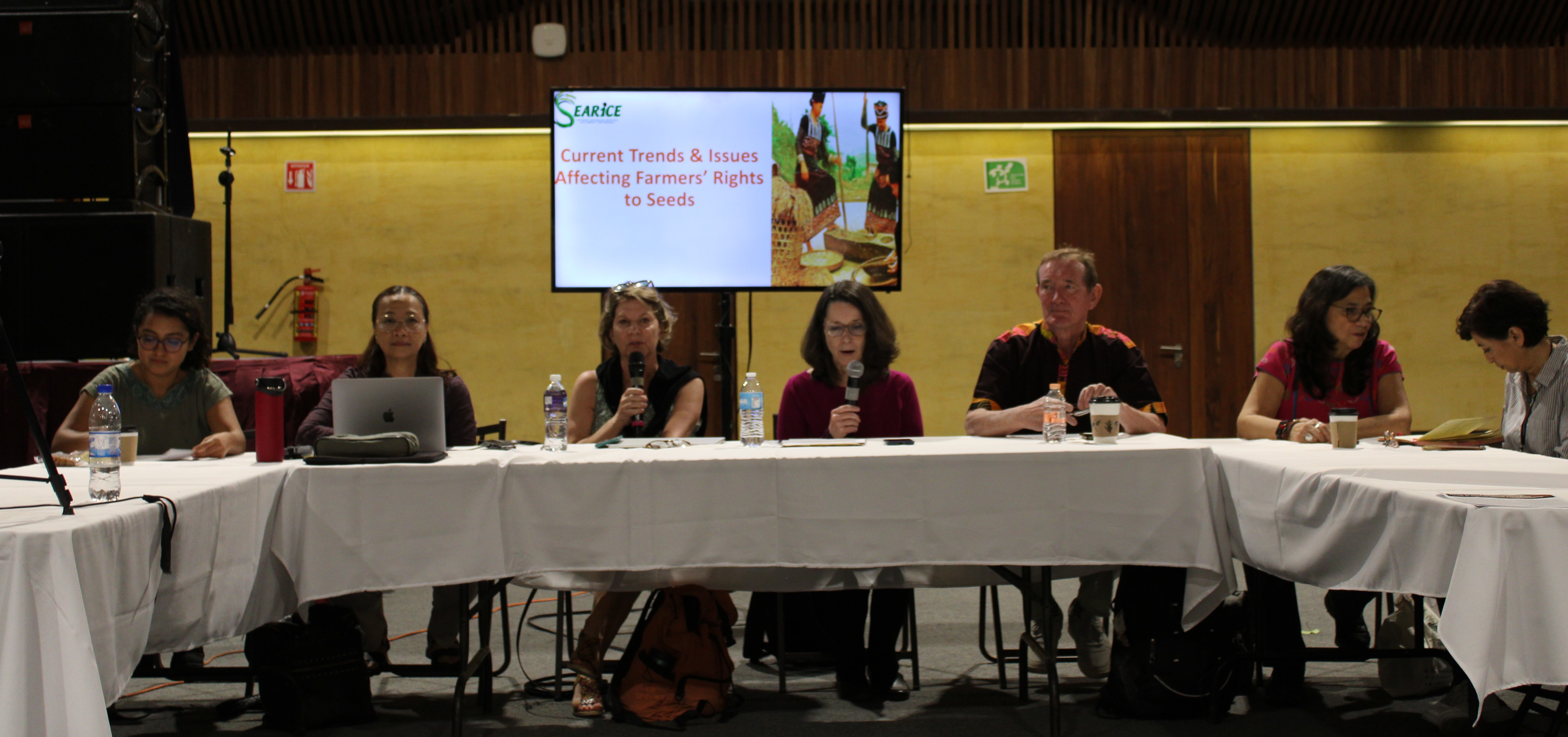
Pictured from left to right: Monserratt Tellez, Semillas de Vida (Seeds of Life); Normita Ignacio, SEARICE; Claire White, Independent translator; Karen Hansen-Kuhn, IATP; Michael Farrelly, AFSA; Adelita San Vicente Tello, Director General of Natural Resources and Biosafety of the Mexican Ministry of Environment; Leticia Lopez Zepeda, Executive Director of the Mexican farmers organization Asociación Nacional de Empresas Comercializadoras de Productores del Campo (ANEC).
Normita Ignacio, executive director of SEARICE,1 began the event by affirming that farmers (who in her region supply up to 80% of seeds) are the stewards of seed diversity. She described how for them, Farmers’ Seed Systems, which entail collective ownership of seeds and genetic resources by communities, are the bedrock of agroecological transitions. At the same time, with the spread of industrial food systems — from monoculture production to ultra-processed foods and drinks — there is an alarming rate of diversity loss of genetic resources.
Focusing on the current trends and issues affecting farmers’ rights to seed systems, she noted that even though several international treaties (such as the ITPGRFA) and declarations (such as the UNDROP) recognize the importance of farmers’ seed systems, implementation of these international recommendations continues to be a challenge, as it is based on national law, uneven across countries.
Normita also drew our attention to the inequities embedded in the Multilateral System (MLS) of Access and Benefit-Sharing (ABS) of Plant Genetic Resources for Food and Agriculture (PGRFA). Since the early 1970s, seeds and plant genetic information have been saved in an international seed bank under the aegis of the Consultative Group on International Agricultural Research (CGIAR). While interested parties in all countries, including non-members of the ITPGRFA, can have access to the seeds deposited there by national governments, the benefits to the developing countries providing the seeds are often inadequate. Currently, access to those seeds is assured for research, but the benefits are only shared when the seed is commercialized. In order to address this imbalance, developing counties are proposing a subscription model that would include a steady flow of payments; so far this proposal has been unacceptable to developed countries.
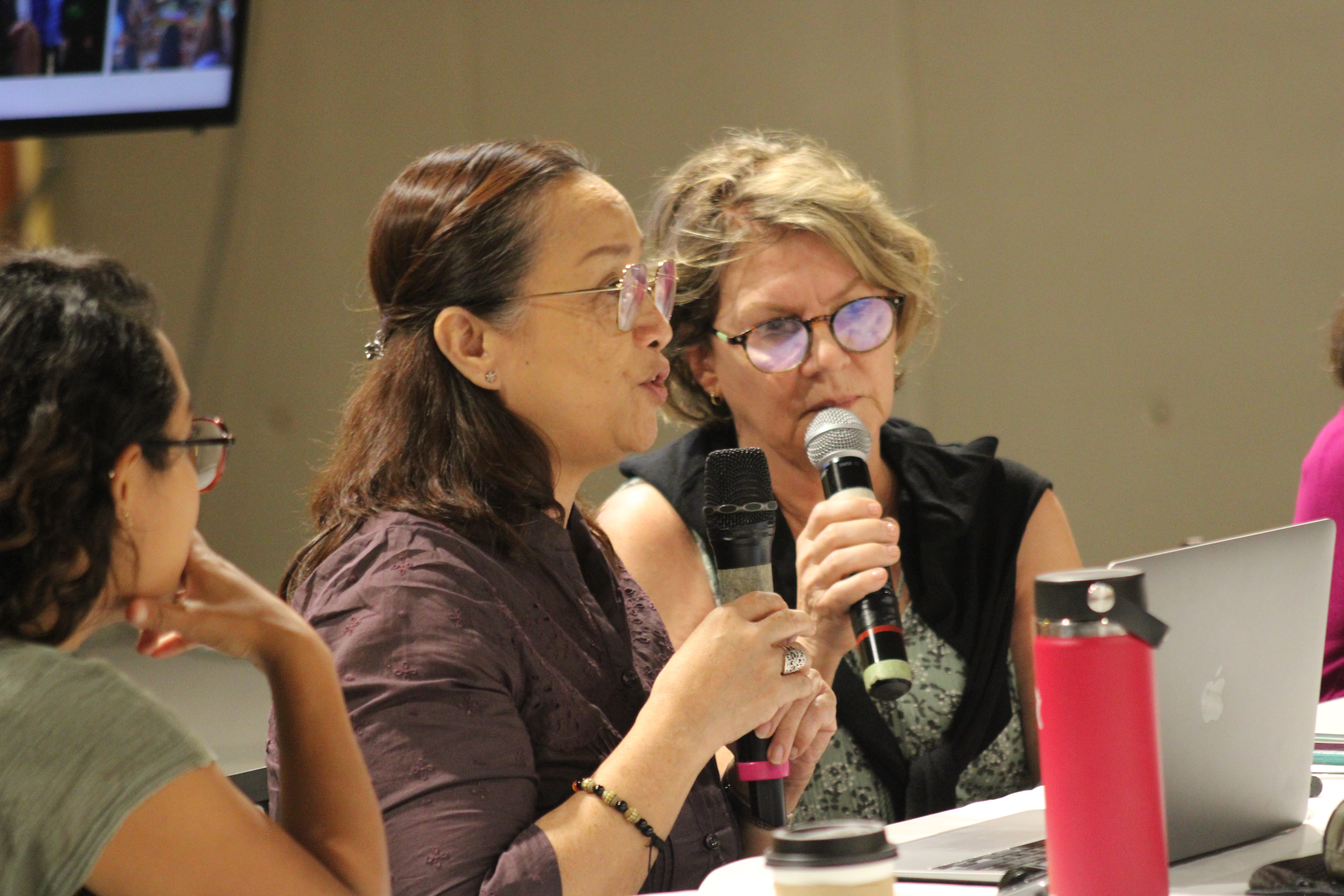
Normita Ignacio, SEARICE, and translator Claire White.
Adelita San Vicente Tello, director general of natural resources and bioosafety of the Mexican Ministry of Environment, spoke next. Before joining the government, she led the effort to defend Indigenous peoples’ corn and seeds in their territories. She pointed out how the norms described by Normita run counter to local seed systems and can be instruments for the appropriation of natural resources in countries with great biocultural diversity.
For example, Mexico joined the International Union for the Protection of New Varieties of Plants (UPOV) in 1997 under the 1978 version of the UPOV Convention. UPOV 78 protects farmers' rights over seeds; the subsequent 1991 UPOV Convention (UPOV 91) does not maintain this protection. However, as a result of commitments arising in trade agreements, Mexico has been under great pressure to join UPOV 91. Thanks to sustained public campaigns, national laws were never harmonized under UPOV 91.
Adelita explained that another normative instrument is the Nagoya Protocol on Access to Genetic Resources and the Fair and Equitable Sharing of Benefits Arising from their Utilization, a complementary Agreement to the Convention on Biological Diversity to which Mexico is a party and which entered into force in 2014. Under this framework in 2015, when Mexico was under a neoliberal vision that allowed the commercialization of multiple resources, the Peña Nieto government granted a permit to access samples of Olotón corn to a group of researchers from University of California Davis and the multinational Mars.
Olotón is one of many native corn varieties in Mexico. There had been research on the soil nitrogen-fixing ability of this corn since the 1990s. UC Davis researchers had accessed and exported corn samples from Mexico for at least nine years for their research before receiving permission.
In 2018, the company researchers, who now had their Access Certificate, published research results describing how bacteria thriving in the mucosal environment of the adventitious roots of maize extract nitrogen from the air and make it available to the plant. It was only then that Mexican civil society and academia learned of an agreement between community leaders and BioN2 (a subsidiary of Mars, Inc.) on access and benefit sharing of local genetic resources, the terms of which were kept private. Although Mexico is a signatory to the Nagoya Protocol, it has no clear national laws governing benefit-sharing agreements with multinationals and academics from countries that have the technology.
Both the norms included in UPOV and the national laws that were developed for its application cover intellectual property rights over seeds, which is only the tip of the iceberg of a much larger system of access to genetic resources. This system is based on the great diversity of wild and domesticated species in a megadiverse country like Mexico. International treaties seek access under the principle of fair and equitable participation.
She added that the problem is that we do not yet have norms that truly protect the great wealth that is the basis of seeds, but also of medicines and other industries such as cosmetics or textiles. Mexico's Constitution states in Article 27 that "The Nation shall at all times have the right to... regulate the use of natural elements susceptible of appropriation, to make an equitable distribution of public wealth and to take care of their conservation." It is imperative to establish regulations in law for this constitutional precept and to achieve the protection of this great wealth, maintaining a policy of national sovereignty over natural resources in order to avoid their constant plundering. Central to this is the recognition of the work by indigenous peoples for the development of knowledge and conservation of this wealth, as well as the awareness of scientists on the need to protect to prevent the loss of biodiversity.
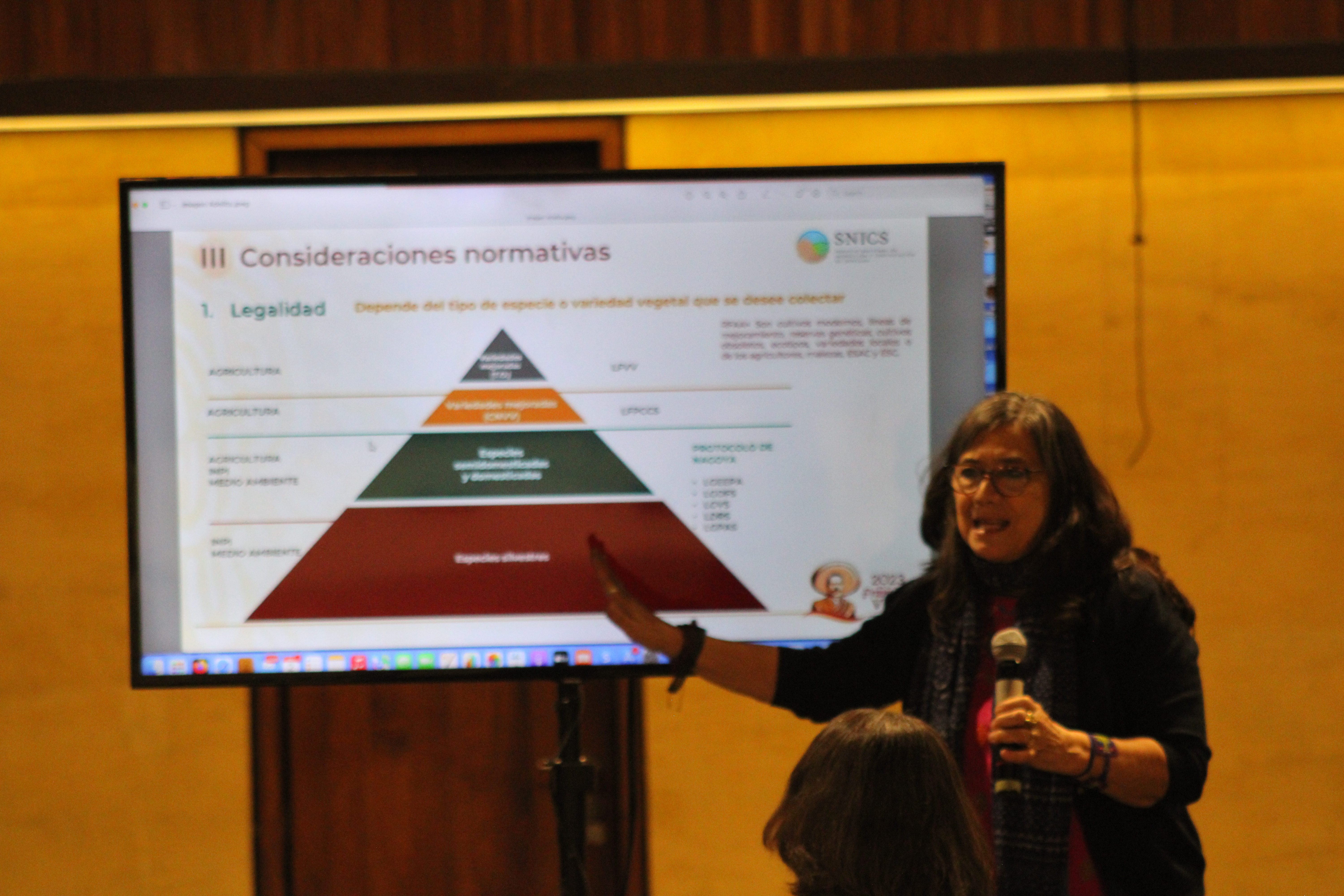
Adelita San Vicente Tello, Director General of Natural Resources and Biosafety of the Mexican Ministry of Environment.
A new area of concern that both Adelita and Normita pointed to is digital sequencing of seeds. Even without physical access to a seed or its genetic materials, scientists can reconstitute the digital sequence of the seed using synthetic biology or insert specific traits into another seed. While developed countries argue that genetic sequencing is not subject to benefit sharing, developing countries disagree.
Several presenters also raised concerns over the corporate capture of seeds. This issue is most visible in the case of the global seed market. Normita cited data showing that in 1985, the top nine companies controlled 12.5% of the global seed market. By 2012, that share had increased to 62%. As of 2020, the top four multinationals accounted for 51% of the market. This corporate concentration also extends to other related areas. For example, the same four corporations accounted for 61.3% of agrochemicals market share in 2020.
This corporate dominance often extends to other governance-related processes, such as developing laws and regulations, whether in the area of intellectual property rights, seed certification or marketing-related laws, as well as to narrative building focused on agricultural productivity.
Michael Farrelly, program officer of the Alliance for Food Sovereignty in Africa (AFSA), elaborated on this from his own experiences with AFSA member organizations in Africa. AFSA is the largest civil society organization in Africa, a broad alliance reaching around 200 million people in 50 countries, mostly small-scale food producers. Michael shared the story of how since the 1990s the seed industry had “helped” African nations that were desperate to meet deadlines to harmonize laws and regulations to smooth the flow of goods and services across borders as part of regional economic integration pacts. The seed industry exploited this need by supporting governments to install common plant variety protection (PVP) laws and seed trade laws that were compliant with UPOV 1991, a restrictive international treaty. That system favors distinct, uniform and stable hybrid seeds in the so-called "formal" seed system.
First, the attempt was to influence the member countries of various Regional Economic Communities (regional groupings), including the Southern African Development Community (SADC), Economic Community of West African States (ECOWAS) and East African Community (EAC), to harmonize their laws and regulations across regions; 10 years later the effort has expanded to the African Continental Free Trade Area (AfCFTA) — across all 54 countries. The AfCFTA Protocol on Intellectual Property Rights (IPRs) promotes harmonization of standards and regulations to establish intellectual property rights for protected plant varieties and genetic resources. This could increase barriers to farmers saving and sharing seeds included in that system, threatening the potential for agroecological transitions and food sovereignty in African countries.
Michael described how African CSOs are collaborating to resist the African Union guidelines and AfCFTA protocol and are working on the implementation of Article 9 of the ITPGRFA Secretariat and putting farmers’ rights into practice. They have also joined a global campaign to stop UPOV91. The seeds that are not covered under UPOV91, which farmers — often women — select, save, share and exchange, are not mentioned in these laws, nor are farmers’ seed systems.
But when it comes to the policy narrative, the seed industry has convinced governments that farmers’ seeds are "substandard" and that African agriculture can only develop by increasing the use of hybrid and GMO seeds, synthetic fertilizers and toxic pesticides. AGRA (previously known as the Alliance for a Green Revolution in Africa), which is majority funded by the Gates Foundation, is a key driver of this harmful policy narrative on agricultural industrialization among African States. Many national seed laws actually forbid the use of the term “seed” to apply to farmer-saved seeds, arguing that its quality is not certified by the government and it can only be called “grain” — even though 80% of all seeds planted in Africa are farm-saved seeds. Thus, shifting the narrative in favor of farmers’ seed systems is key for resisting industrialization and facilitating agroecological transitions.
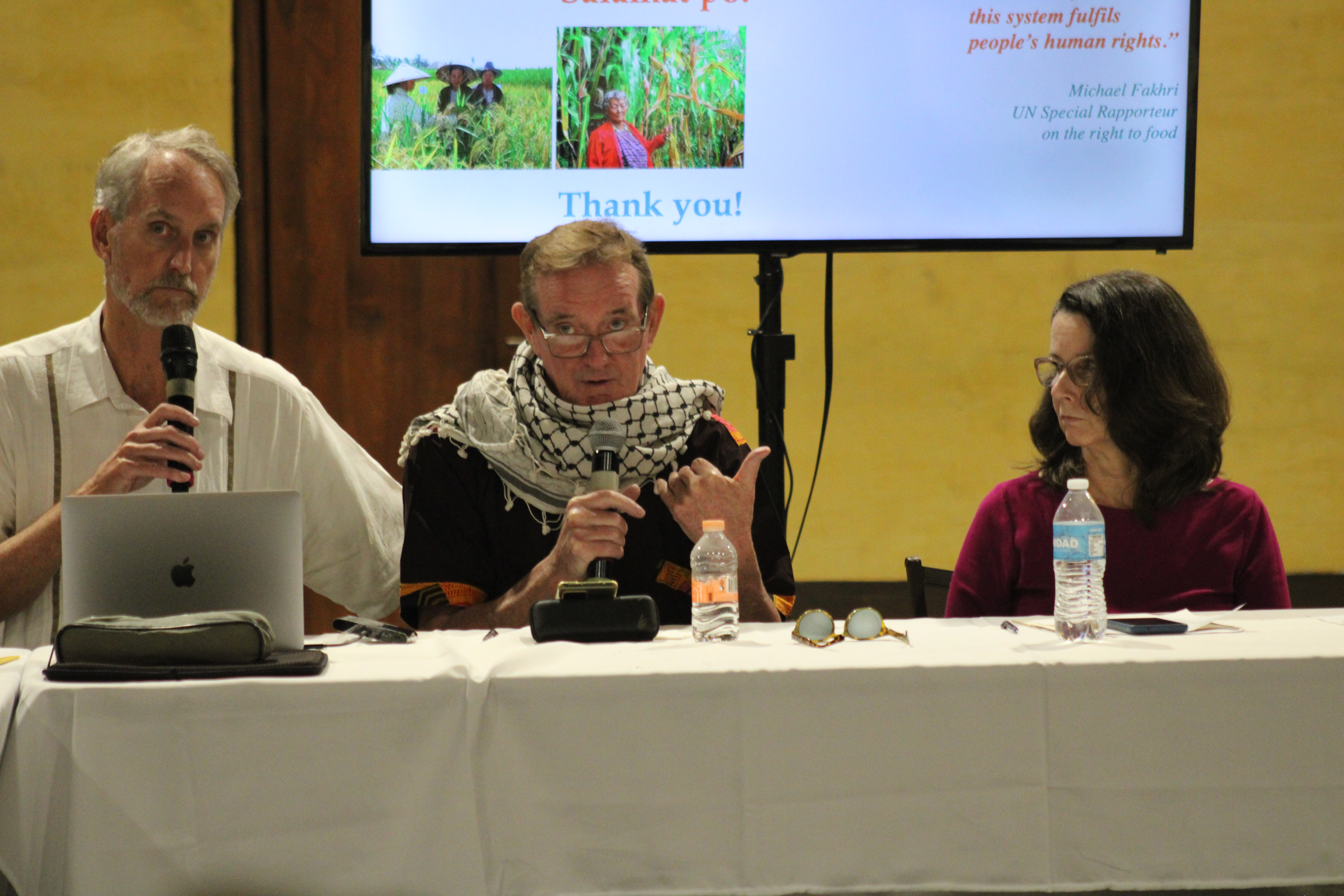
Timothy Wise, IATP; Michael Farrelly, AFSA; Karen Hansen-Kuhn, IATP.
A shift to hybrid or GMO seeds that depend on agrochemicals can also have negative impacts on local seed varieties and biodiversity in general. Further research is needed to understand the scale and extent of these impacts on agrobiodiversity, which can affect indigenous communities’ food security and human rights. Monserratt Tellez, from the Mexican organization Semillas de Vida (Seeds of Life) also emphasized this point.
Last but not least, Leticia Lopez Zepeda, executive director of the Mexican farmers organization Asociación Nacional de Empresas Comercializadoras de Productores del Campo (ANEC), centered her reflections on how the fight for seeds is part of a holistic vision, which in Mexico includes the ongoing fight against the herbicide glyphosate. She also drew attention to the role of civil society to remain vigilant and hold governments accountable, so as to ensure that agroecological transitions are just and inclusive and respect each country’s multicultural heritages and biodiversity. Agroecological transformation is not simply a model of production, but a fight for a life that can help counter fragmentation in our lives and societies, that can help us connect with different groups and different countries going beyond food systems transformations in support of building food sovereignty and ecological resilience.
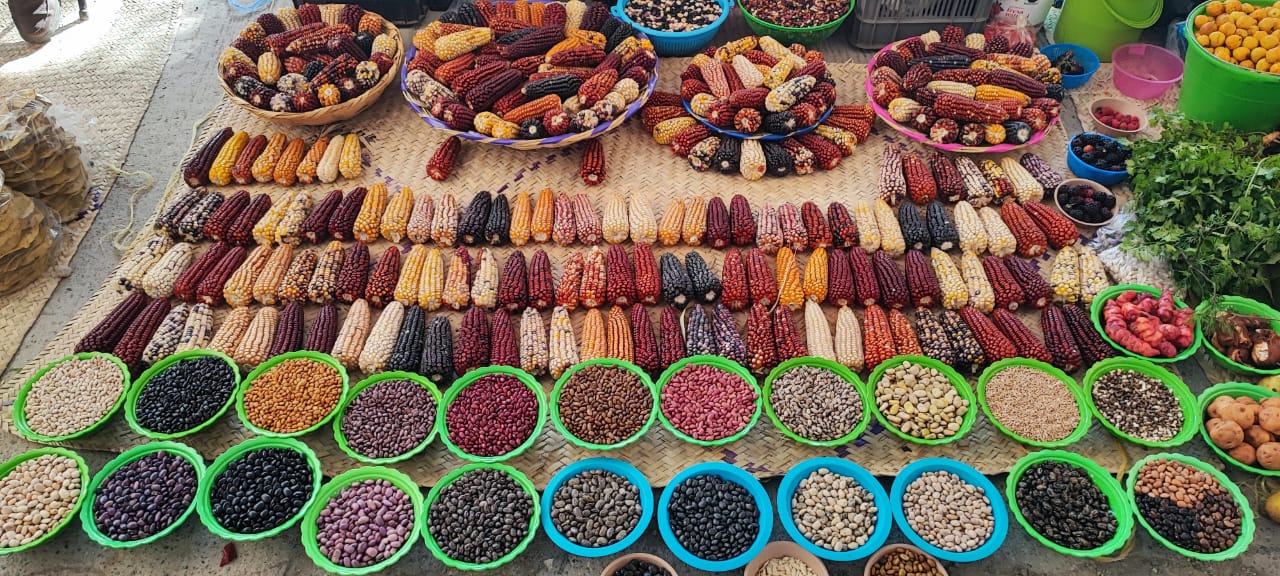
A bounty of diverse maize and seeds on display at a field visit in Oaxaca during the conference. Photo by Michael Farrelly.
Footnotes
1. The Southeast Asia Regional Initiatives for Community Empowerment (SEARICE) is a civil society organization (CSO) working in partnership with other CSOs, as well as government, academic and research institutions, in 10 countries in South and Southeast Asia since 1977.
